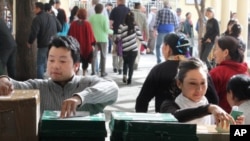Tens of thousands of exiled Tibetans around the world voted on Sunday to elect a prime minister for the third time, along with members of the 15th Tibetan Parliament in exile, days after the Dalai Lama announced his decision to retire as the political leader of the Tibetan exile government.
The Dalai Lama escaped from Chinese-ruled Tibet to Dharamsala, in northern India, in 1959. Since then, Dharamsala has been the site of the Tibetan government-in exile.
Over the years, the Dalai Lama has worked to hand over more and more of his political role to a democratically-elected prime minister. The Tibetan spiritual leader now appears more than ever determined to transfer complete political authority to a new generation of Tibetan leaders.
Monks, nuns and ordinary Tibetans voted for a successor to the current prime minister, Samdhong Rinpoche, who has twice held office.
From the primary round conducted in October last year, three candidates have emerged as the candidates for the highest elected leadership post in Tibet’s government in exile. All three candidates for prime minister—Lobsang Sangay, Tenzin Namgyal Tethong and Tashi Wangd—are younger, Western-educated and well known to the Tibetan diaspora.
Lobsang Sangay is a Fulbright scholar and senior fellow at Harvard Law School. He has extensively researched the history of Tibetan democracy and worked with the government-in-exile. He was born in a Tibetan refugee camp in Darjeeling in the northeastern region of India.
Tenzin Namgyal Tethong, a distinguished fellow at the Tibetan Studies Initiative, Stanford University, has worked for the Tibetan exile Government in several positions including as the head of the departments of Finance, Home, and Information & International Relations.
Tashi Wangdi, formerly at the Office of Tibet, in Brussels has worked for the Tibetan Government since 1966 holding various high offices.
There are over 83,000 registered voters from Tibetans in India, North America, Europe, Japan, Taiwan, and Australia, according to Chief Election Commissioner Jampal Choesang. Results of the election are expected in April 27.
The Dalai Lama, who has spearheaded the cause of exiled Tibetans since he fled his homeland more than half a century ago said that he will continue to work for Tibetans. The revered monk will continue to serve as the spiritual head of the Tibetan people.
Some information for this report was provided by AP and AFP





